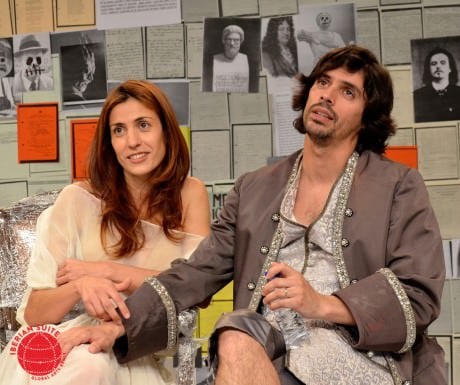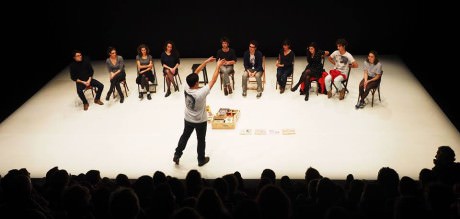The Mundo Perfeito (Perfect World) has arrived in DC’s America. As part of the Iberian Suite. At The Kennedy Center.

Presenting a full evening of theatre, Mundo Perfeito offers two productions: Three fingers below the knee and By Heart. Technically one-acts, both shows run about 90 minutes each.
Both shows share similar concerns. Both offer worlds where the threat of totalitarian control looms large. Both offer people concerned with art and texts and the meaning of existence. Both offer “stories” that explore the psyche’s interior spaces, even though both use dramatically different methods to carry out that exploration.
And it is in those differing methodologies that the theatre’s promise and passion lie.
Bottom line is this: By Heart, the evening’s second show, evokes the paratheatrical: a space of transformation and renewal Three fingers below the knee, the opening act, does not translate as well to an American stage.
Go see Mundo Perfeito’s U.S. debut. Go for the culture. Stay for the second act. It’s not the theatre you’re used to seeing, but it’s definitely the theatre you’ll wamt to see more of.
The roots of Three fingers below the knee, written and directed by theatre founder Tiago Rodrigues, are firmly planted in Portugal’s dictatorship (1926 to 1974). The play uses texts found in Portugal’s national archive, texts compiled by the dictatorship’s theatrical censors as they went about their business of cutting and replacing words and actions, words and actions that the State found objectionable to either “public” or “church” or “governmental” interests.
The resulting three-scene one-act is not so much a dramatization of the censorship process but a psychic exploration of the Zeitgeist that leads human beings down that rabbit hole of impossible absurdities. Remember the film industry’s Production Codes and 1950’s and 60’s TV censorship that outlawed belly buttons and swinging pelvises and toilet seats. Now, imagine them of steroids.
Isabel Abreu and Gonçalo Waddington perform the collage-like text in Portuguese, with the English translation flashed on large backdrop behind them. Unfortunately, these projections are slightly too small to read comfortably, given the backdrops textured surface of playbills and news clipping, much like the placards of the Disappeared. For the non-Portuguese speakers among us, this difficulty of reading added an additional layer of stress to an already complex theatrical event.
Nevertheless, the actors present the collage with searing authenticity, pointing out just how ludicrous the censorship’s mindset was.
Of course, the “political” is but a small portion of their concern. As in America, of far greater concern is the power of the female body. And Ms. Abreu’s body plays a central role in materializing that focus.
At one point Mr. Waddington uses lipstick to write on her near naked flesh, turning her skin into parchment, a highly sexualized parchment with its red markings on belly and thighs. He also demonstrates where, according to the censors, the dress line should be: three inches below the knee.
Near the end of the play, with the ludicrousness of prohibition permeating the stage, Ms. Abreu begins to “clean” her near naked body of the text that has marked it. The red lipstick smears and smears until only a thin coating remains, No longer legible, she is now bloodied by the regime’s cuts.
The second show, By Heart, brings the theatre’s founder, Tiago Rodrigues, onto the stage. Performing in English (one of many languages he speaks), he then asks ten audience members to join him on stage. Their task will be to learn a poem by heart.
By Heart takes the form of a workshop and turns it into a paratheatrical event with profound implications.
Written and directed and performed by Tiago Rodrigues, By Heart has none of the slick polish to which District theatre-goers have grown accustomed. It really is Tiago Rodrigues standing on stage, inviting ten audience members to join him; he then, while “really” working with the participants to help them learn the poem by heart, he tells a series of stories, “true” and fictionalized, about the significance of learning literary texts “by heart”.
There are the texts learned by heart in Fahrenheit 451; there is a fascinating story about Boris Pasternak and Shakespeare’s Sonnet #30 and Stalin’s Soviet Union; and there is the touching stories about Rodrigues’s own grandmother, Candida, and her love of reading and cooking, as well as her desire to learn one book by heart before she goes blind.
The ritual of theatre, the merging of the personal with the political, is what makes By Heart so profoundly theatrical, so richly political, and ultimately so deeply moving, as each of us yearns for an identity worthy of our too brief lives.
Clearly, anyone who has developed strict ideas about what theatre should or should not be won’t find Rodriques’s By Heart fulfilling. From an aesthetically rigid perspective, its pacing is slow, its pauses are “unprofessional”, its direct engagement of the audience with the persona of the actor is “not” theatre.
In this sense, By Heart, is more community gathering than theatre.
In this sense, it returns theatre to its most essential roots: people coming together in a public space to transmit the stories that constitute their identity, one to the other.

In this sense, as I sat in the theatre and considered the stories that most American’s “eat”, I felt deeply saddened by our trivialization of culture and its heritage.
In this sense, the goal of the Free Speech Movement that blew the lid off censorship in the United States did not aim to create an anything-goes-environment, but a public space that forces the artist to truly take responsibility for the power that he or she possesses.
The power to inhabit another person’s soul.
And that is the aesthetic space Mundo Perfeito’s evening of theatre creates for its audiences.
And the stories we consume become us, be they episodes of Survivor, lyrics from the latest pop song, short stories in The New Yorker, or Shakespeare’s Sonnet #30.
When to the sessions of sweet silent thought
I summon up remembrance of things past,
I sigh the lack of many a thing I sought,
And with old woes new wail my dear time’s waste:
Then can I drown an eye, unus’d to flow,
For precious friends hid in death’s dateless night,
And weep afresh love’s long since cancell’d woe,
And moan the expense of many a vanish’d sight:
Then can I grieve at grievances foregone,
And heavily from woe to woe tell o’er
The sad account of fore-bemoaned moan,
Which I new pay as if not paid before.
But if the while I think on thee, dear friend,
All losses are restor’d and sorrows end.
Three fingers below the knee and By Heart remind us not only how important it is to give people the ability to choose their own stories but how equally important it is to choose those stories wisely.
For the stories we consume become us, forever and ever.
Running Time: 2 hours and 50 minutes, with a 20-minute intermission.
Mundo Perfeito plays one more night, tonight, March 8, 2015 at 7:30 pm in the Terrace Theater at The Kennedy Center – 2700 F Street, NW, in Washington, DC. For tickets, call the box office at (202) 467-4600, or purchase them online.
For other events in the Kennedy Center’s Iberian Suite: Global Arts Remix, click here.




